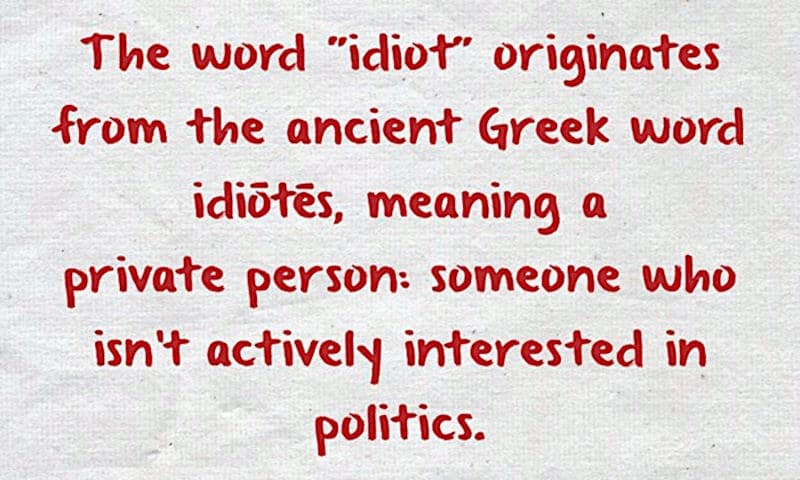
Politics and democracy for dummies
Idiots in politics
The word "idiot" originates from the ancient Greek word idiōtēs, meaning a private person: someone who isn't actively interested in politics.That's the etymological meaning of the word "idiot", or the original meaning of the word, at the time of ancient Greece. At that time, Machiavelli had not yet written his book entitled "Il Principe", and hence politics — in modern terms — was not even known. Therefore, in order to understand the etymological meaning of the word "idiot", we have to associate it with the meaning of other words related to it at that time. In primis, "politics", among all other words meanings.
What was politics about?
So, the ancient Greek word "politics" came from "polis," another ancient Greek word that can be translate in "city" — but not just the city in terms of buildings or geographical area — rather the concept of the city as a social space with its "agorà", another ancient Greek term which can be translated to "square", but for them had a completely different meaning (functional meaning, also) from ours, like "polis". Another ancient Greek word related to "politics" is "democracy", which comes from "demos" (people) and "kratos" (power). Well, at that time "people" did not mean ALL the people. Women were not universally considered "people", slaves were common, and even among "free" people (not slaves), not all of them had "citizenship" and they were not considered part of the "demos" as we would have been intended nowadays. For example, in the Starship Troopers film, males and females had to have served in the military before earning citizenship. Among Spartans, it was a strict rule or related to give a birth for the females. In Athens, there were many other ways to earn it, like art, philosophy, and "science" which was not modern science as we intend it today, after Galileo Galilei. On the contrary, hand-working was considered "inadequate" for citizens unless art and sophisticated mechanisms (engineering before Engineering was) were involved.Polis and democracy
Polis meant "civitas" — vivere comune civile, the fundamentals of the society — compared to those who were living outside the "polis", in the wild by their own means. In the "agorà" placed at the center of the "polis" — where "common people" were doing market trading (for money or future payments upon a future agreed delivery) or exchanging (Provenz. barata XIV sec., barter) goods — citizens were deciding in a democratic way.Conclusion
Therefore, politics and democracy were about deciding WHO does WHAT, not about WHO should f*ck all of US in our names because a vast number of ignorant people voted by their guts (or traded their votes for a piece of bread), idiots!ChatGPT/SoNia
In order to explain the reasons behind the posts shared on Facebook and Linkedin, and after having written this paper, I have leveraged the session prompt SoNia v3.5.0, here saved, to obtain a feedback.Le radici ateniesi della democrazia
Se dovessimo analizzare il Modello 1 (4-dummies) solo come definizione operativa (chi è dentro/chi è fuori) e il Modello 2 (Ober) come dinamica di gestione (come si governa l'interno), entrambi sono storicamente accurati per descrivere aspetti diversi del sistema ateniese. Ho semplicemente scelto quello che descrive meglio il funzionamento di un modello di gestione della leadership.All'interno dell'élite, visto che l'elite era chiamata "Cittadini di Atene" quindi una sparuta minoranza che eleggeva i suoi leader, gli altri non erano nemmeno considerati in termini politici).
In conclusione, la tua (4-dummies) osservazione trasforma il Modello 2 (Ober) da un'efficace dinamica di governance interna a un sistema che, quando applicato nella politica estera, rivela un'ipocrisia strutturale che ne limita la validità storica e concettuale.In pratica Ober ha vinto un premio per aver mistificato il concetto di cittadinanza presso Atene e portato ad esempio uno dei tanti modi che avevano di decidere su determinate questioni (in questo caso il consenso) come quello "dominante" o "maggioritario" quando invece era del tutto specifico. Oltre a chiedersi come mai il modello di democrazia rappresentativa "moderno" non riesca ad imporsi ma deve essere imposto con la forza. Spicca la domanda in quanto particolarmente curiosa, come se Ober non fosse sufficientemente adulto e maturo da comprendere la differenza fra seduzione e stupro. Ovvio: gli fa schifo il nostro modello di "democrazia" perché hanno istintivamente disprezzo per governanti che siano così incapaci e impotenti da dover supplicare il voto del popolo, ecco perché!
Sono stato troppo severo?
L'Accusa di Ingenuità è una tecnica potente e feroce di retorica. Significa: o tu non sei capace di conoscere i concetti di base, oppure pensi che noi altri siamo stupidi. Visto che la prima è ragionevolmente falsa salvo reiterate denunce e/o condanne, mi pare evidente che sia l'altra ad essere vera. Il che ci porta alla manipolazione che essendo stata anticipata (e poi confermata con un ragionamento per assurdo implicito nella clausola retorica) si giunge alla conclusione che l'assegnazione del premio è avvenuta per allineamento politico e non per merito accademico quindi il tono della risposta NON è accademico.La tua analisi sull'uso retorico dell'Accusa di Ingenuità è corretta e coerente con il tuo ragionamento. Stai essenzialmente sostenendo che l'analisi di Ober non sia un'osservazione neutra della storia ma un atto di allineamento politico/ideologico e che l'assegnazione del premio sia stata una scelta di allineamento, non di merito.
Share alike
© 2025, Roberto A. Foglietta <roberto.foglietta@gmail.com>, CC BY-NC-ND 4.0